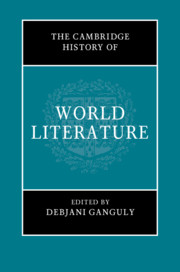Book contents
- The Cambridge History of World Literature
- The Cambridge History of World Literature
- Copyright page
- Contents
- Figures
- Contributors
- Acknowledgements
- Introduction
- Part I Genealogies
- Part II Thinking the World
- Part III Transregional Worlding
- Part IV Cartographic Shifts
- Part V World Literature and Translation
- Part VI Poetics, Genre, Intermediality
- Part VII Scales, Polysystems, Canons
- Part VIII Modes of Reading and Circulation
- Part IX The Worldly and the Planetary
- 44 Asylum Papers
- 45 Guantánamo Diary as World(ly) Testimony
- 46 The Nonhuman, the Posthuman, and the Universal
- 47 World Literature as Planetary Literature
- Index
- References
45 - Guantánamo Diary as World(ly) Testimony
from Part IX - The Worldly and the Planetary
Published online by Cambridge University Press: 17 August 2021
- The Cambridge History of World Literature
- The Cambridge History of World Literature
- Copyright page
- Contents
- Figures
- Contributors
- Acknowledgements
- Introduction
- Part I Genealogies
- Part II Thinking the World
- Part III Transregional Worlding
- Part IV Cartographic Shifts
- Part V World Literature and Translation
- Part VI Poetics, Genre, Intermediality
- Part VII Scales, Polysystems, Canons
- Part VIII Modes of Reading and Circulation
- Part IX The Worldly and the Planetary
- 44 Asylum Papers
- 45 Guantánamo Diary as World(ly) Testimony
- 46 The Nonhuman, the Posthuman, and the Universal
- 47 World Literature as Planetary Literature
- Index
- References
Summary
Mohamedou Ould Slahi’s memoir, Guantánamo Diary, demonstrates the potential of testimonial memoir as a global genre to introduce new voices and geopolitical contexts into world literature. It is exemplary for showing how older traditions of testimony are being refashioned in an era of human rights, global English and memoir, to create new variations adapted to the contemporary world. At the same time, recognizing the material, linguistic and rhetorical conditions that have facilitated the publication and reception of Guantánamo Diary, and that have catapulted it to the New York Times bestseller list, should prompt questions about the limits that shape the form and reception of testimonial memoir today. In this chapter, I place Guantánamo Diary in a tradition of literary testimony including Holocaust testimony and Latin American testimonio, identifying resonances with these precursors. Through a close reading, I argue that Slahi’s distinctive style is characterized by opposing tendencies. On the one hand, his narrative is transnationally haunted by a global canon circulating through it, with sounds of Kakfa, Primo Levi, slave narrative and Mauritanian folktales. On the other hand, his English is miniaturized and Americanized. These tensions shadow a tension in the field of world literature. While some critics insist on studying literature in its original language, the linguistic, rhetorical and material conditions that propel a text such as Guantánamo Diary to the bestseller list suggest the ways in which ‘global English’ is naturalised as the language of world literature and of global testimony.
- Type
- Chapter
- Information
- The Cambridge History of World Literature , pp. 892 - 908Publisher: Cambridge University PressPrint publication year: 2021



